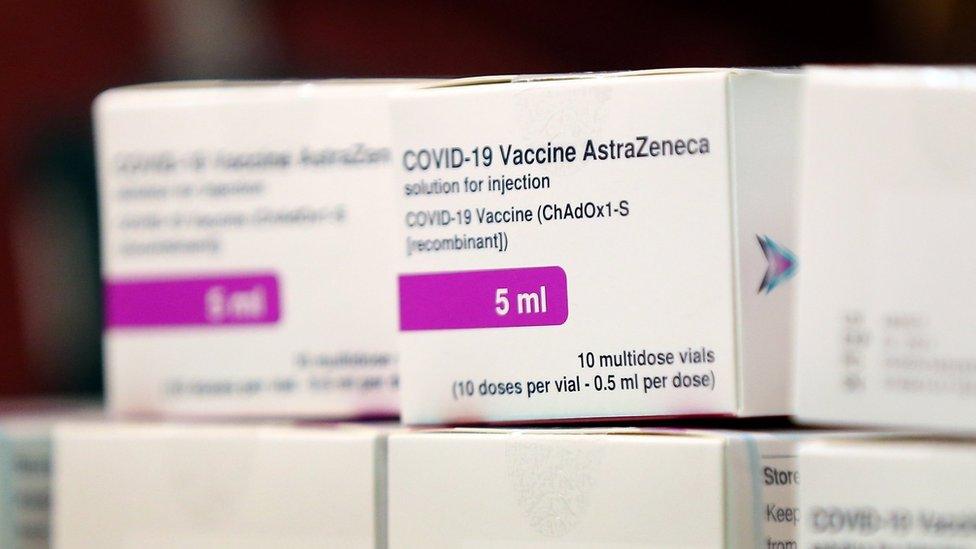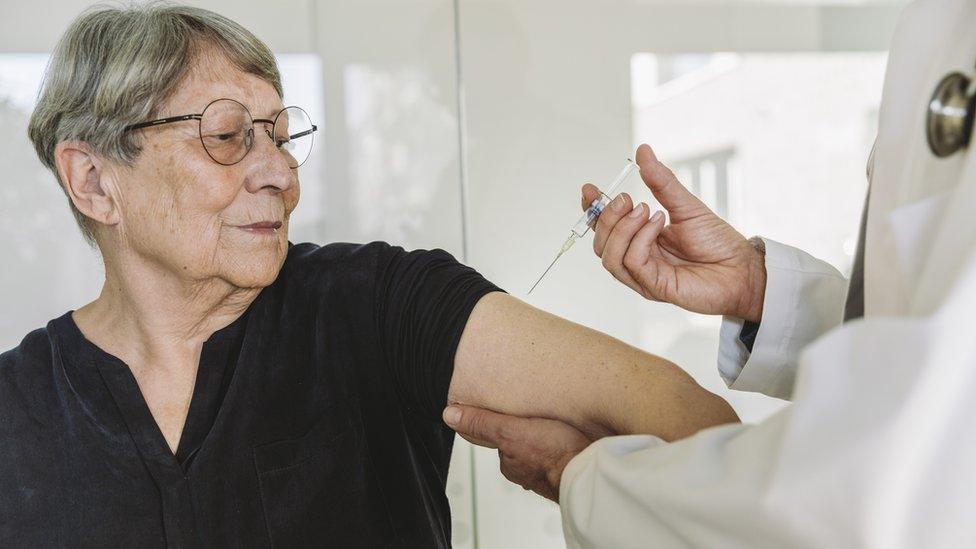Covid-19: Oxford vaccine rolled out to hundreds of GP sites in England
- Published
- comments
At Fullwell Cross Medical Centre, north London, they are now vaccinating almost 1,000 people a week
The Oxford-AstraZeneca Covid vaccine is being rolled out to hundreds of GP-run vaccination sites in England.
As part of the biggest vaccination programme in NHS history, the aim is to offer jabs to most care home residents by the end of January.
By mid-February, the target is to vaccinate 13 million people in the top four priority groups.
But one surgery visited by the health secretary to promote the initiative said its delivery had been delayed.
And leaders in Birmingham have warned stocks of the Pfizer-BioNTech vaccine are scheduled to run out in the city on Friday, and that it has not received any supplies of the Oxford-Astra Zeneca jab.
A letter, external sent to Health Secretary Matt Hancock, signed by the Labour leader of Birmingham City Council, Ian Ward, Labour MP Liam Byrne and Conservative MP and former minister Andrew Mitchell, said there was "currently no clarity on when further supplies will arrive".
They also criticise a lack of clarity over the vaccination programme, and say "it remains unclear who is responsible for overseeing the vaccination programme in Birmingham, and whom we should hold accountable for progress and delivery".
More than 700 local vaccination sites will administer the Oxford jab.
Another 180 GP-led sites, 100 new hospital sites and a pilot scheme involving local pharmacies will open this week.
Selected hospitals began administering the vaccine on Monday.
Mr Hancock said the jab was now being supplied to GP practices across the country as he visited the Bloomsbury Surgery in central London.
The health secretary said he was "delighted" care homes residents would begin receiving their first Oxford jabs this week.
"This will ensure the most vulnerable are protected and will save tens of thousands of lives," he said.
But GP Ammara Hughes, a partner at Bloomsbury Surgery, told broadcasters its first delivery of the jab had been pushed back 24 hours to Thursday.
She said: "It's just more frustrating than a concern because we've got the capacity to vaccinate. And if we had a regular supply - we do have the capacity to vaccinate three to four thousand patients a week."

Standing in front of Dr Hughes's surgery, Mr Hancock said: "The rate-limiting step is the supply of vaccine. We're working with the companies - both Pfizer and AstraZeneca - to increase the supply."
The surgery said it was continuing to administer the Pfizer-BioNTech vaccine and had so far received three deliveries of that jab.
Labour leader Sir Keir Starmer said vaccination centres and GP surgeries needed better information about deliveries of the vaccine and how much to expect to arrive.
Shadow health secretary Jonathan Ashworth tweeted, external that the scenes at the surgery were like something from political comedy The Thick of It, but added: "Sadly it's no laughing matter."

The Pfizer-BioNTech vaccine was the first to be approved by the UK's medicines regulator in early December, followed by the British-made Oxford-AstraZeneca vaccine four weeks later.
Because it does not need to be stored at ultra-cold temperatures like the Pfizer-BioNTech vaccine, it can be transported and stored more easily, making it simpler to vaccinate housebound people and those in care homes.
Around half a million doses of both vaccines are ready to be used this week, with millions more in the pipeline in the coming weeks.
Next week, seven major vaccination hubs across England are set to begin operating, including the Excel Centre in London and Millennium Point in Birmingham.


Who will get a vaccine first?
Broadly, vaccines are being given to the most vulnerable first, as set out in a list of nine high-priority groups, external, covering around 30 million people.
They are thought to represent 90-99% of those at risk of dying from Covid-19.
Residents in care homes for older adults and their carers
80-year-olds and over and frontline health and social care workers
75-year-olds and over
70-year-olds and over and clinically extremely vulnerable individuals
65-year-olds and over
16- to 64-year-olds with serious underlying health conditions
60-year-olds and over
55-year-olds and over
50-year-olds and over
People aged over 80 in hospital, frontline health staff and care home workers have been the first to get the Pfizer jab at designated hospitals hubs and community sites across the UK.

Meanwhile, nearly 19,981 second doses of the Pfizer/BioNTech jab were administered between 29 December and 3 January, NHS England said.
Dr Nikki Kanani, a GP and medical director for primary care at NHS England, said the vaccination programme was "off to a strong start with around one million people already vaccinated against coronavirus".
She said GPs, nurses, pharmacists and countless other staff and volunteers had been working "around the clock" to be able to launch almost 200 more sites this week.
"We will now be able to protect many more vulnerable people against the virus and faster," Dr Kanani said.
Nearly a quarter of the over-80s in England have now been vaccinated in total, around 650,000 people, since Margaret Keenan became the first person in the UK to receive a Covid vaccine in December.
On Tuesday, Prime Minister Boris Johnson said 1.3 million people in the UK had received their first dose of a vaccine.
On Wednesday, another 1,041 deaths within 28 days of a positive coronavirus test were recorded, the highest daily death toll since April.
And 62,322 new cases were recorded on Wednesday, the highest daily rise since mass testing began.
Why the Oxford vaccine matters
All of the UK is now under strict virus curbs, with Wales, Northern Ireland and most of Scotland also in lockdown, and vaccinations are progressing across the devolved nations.
England is under a third national lockdown - in a bid to prevent the NHS from becoming overwhelmed by the surge in coronavirus cases.
Scotland's First Minister Nicola Sturgeon announced a new lockdown on Monday - across mainland Scotland, Skye, Arran, Bute and Gigha for the rest of January. Level three restrictions apply in remaining areas of the nation.
Wales has been in a national lockdown since 20 December, and schools and colleges in the nation will remain closed until at least 18 January.
In Northern Ireland - which entered a six-week lockdown on 26 December - "stay at home" restrictions will be brought back into law from Friday.
As of Monday, about 100,000 people in Scotland had already received a first dose of vaccine. The Scottish NHS hopes to vaccinate everyone over the age of 50 and younger people with underlying health conditions by the start of May, supplies allowing.
More than 35,000 people in Wales have had a Pfizer-BioNTech vaccine, and the Welsh government has said 40,000 doses of the Oxford vaccine will be available within the first two weeks.
About 40,000 people in Northern Ireland have received a first dose, and health officials in the nation have said everyone aged over 80 will be immunised within weeks.
Related topics
- Published6 January 2021

- Published2 December 2020
